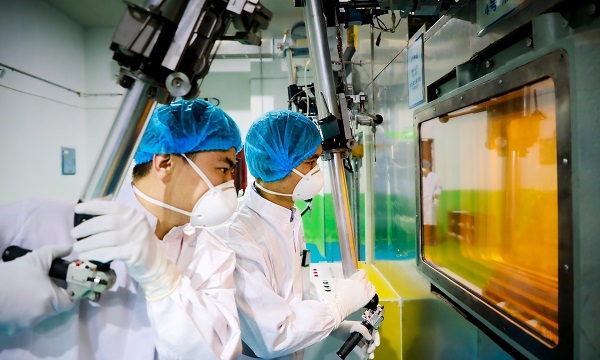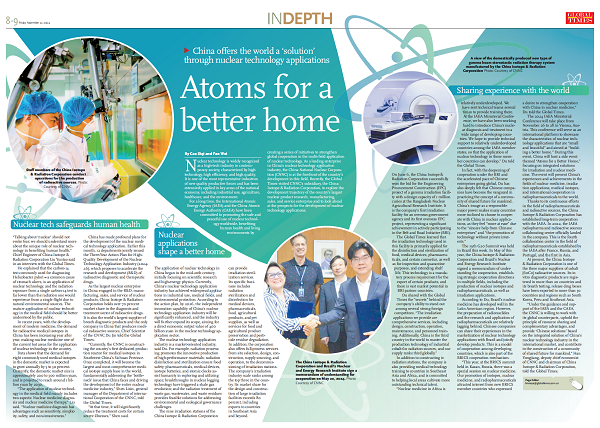
The China Isotope & Radiation Corporation and Brazil's Nuclear and Energy Research Institute sign a memorandum of understanding for cooperation on May 20, 2024. Photo: Courtesy of CNNC
Nuclear technology is widely recognized as a high-tech industry in contemporary society, characterized by high technology, high efficiency, and high quality. It is one of the most representative industries of new quality productive forces and has been extensively applied in key areas of the national economy, including industrial use, agriculture, healthcare, and the environment.
For a long time, the International Atomic Energy Agency (IAEA) and the China Atomic Energy Authority (CAEA) have been committed to promoting the safe and peaceful use of nuclear technology worldwide, benefiting human health and living environments by creating a series of initiatives to strengthen global cooperation in the multi-field application of nuclear technology. As a leading enterprise in China's nuclear technology application industry, the China National Nuclear Corporation (CNNC) is at the forefront of the country's development in this field. Recently, the Global Times visited CNNC's subsidiary, the China Isotope & Radiation Corporation, to explore the development trajectory of the country's largest nuclear product research, manufacturing, sales, and service enterprise and to look ahead at the prospects for the development of nuclear technology applications.
Nuclear tech safeguards human health

Staff members of the China Isotope & Radiation Corporation conduct operations for the production of radioactive sources. Photo: Courtesy of CNNC
"Talking about 'nuclear' should not evoke fear; we should understand more about the unique role of nuclear technology in benefiting human health," Chief Engineer of China Isotope & Radiation Corporation Liu Yuntao said in an interview with the Global Times.
He explained that the carbon-14 test commonly used for diagnosing Helicobacter pylori - a common cause of stomach ulcers, is an application of nuclear technology, and the radiation exposure from a single carbon-14 test is far lower than the radiation one would experience from a single flight due to natural environmental sources. The mature application of nuclear technology in the medical field should be better understood by the public.
In recent years, with the development of modern medicine, the demand for radioactive medical isotopes in China has been increasing year after year, making nuclear medicine one of the current hot areas for the application of nuclear technology in the country. Data shows that the demand for eight commonly used medical isotopes in the domestic market is expected to grow annually by 5 to 30 percent. Currently, the domestic market size is approximately 200 to 300 million yuan, and is projected to reach around 1 billion yuan by 2030.
"The application of nuclear technology in the medical field mainly includes two aspects: Nuclear medicine diagnosis and nuclear medicine therapy," Liu said. "Nuclear medicine diagnosis has advantages such as sensitivity, simplicity, safety, and non-invasiveness."
China has made profound plans for the development of the nuclear medical technology application. Earlier this month, 12 departments jointly issued the Three-Year Action Plan for High-Quality Development of the Nuclear Technology Application Industry (2024-26), which proposes to accelerate the research and development (R&D) of radioactive diagnostic and therapeutic drugs.
As the largest nuclear enterprise in China engaged in the R&D, manufacturing, sales, and service of nuclear products, China Isotope & Radiation Corporation holds over 70 percent market share in the diagnosis and treatment sector of radioactive drugs. It is also the world's largest supplier of breath diagnostic products and the only company in China that produces medical radioactive sources, Chief Scientist of the CNNC Du Jin told the Global Times.
"Currently, the CNNC is constructing the country's first dedicated production reactor for medical isotopes in Southwest China's Sichuan Province. Once completed, it will become the largest and most comprehensive medical isotope supply base in the world, fundamentally addressing the 'bottleneck' issue that China faces and driving the development of the entire nuclear medicine industry," Shen Lixin, general manager of the Department of international Cooperation of the CNNC, told the Global Times.
"At that time, it will significantly reduce the treatment costs for certain severe illnesses," Shen said.
Nuclear applications shape a better home
The application of nuclear technology in China began in the mid-20th century, initially focusing on scientific research and high-energy physics. Currently, China's nuclear technology application industry has achieved widespread applications in industrial use, medical fields, and environmental protection. According to the action plan, by 2026, the independent innovation capability of China's nuclear technology application industry will be significantly enhanced, and the industry will further expand its scope, aiming for a direct economic output value of 400 billion yuan in the nuclear technology application sector.
The nuclear technology application industry is a market-oriented industry, said Du. For example, radiation processing promotes the innovative production of high-performance materials; radiation disinfection and sterilization ensure food safety; pharmaceuticals, medical devices, isotope batteries, and atomic clocks assist humanity in exploring and utilizing space; breakthroughs in nuclear logging technology have triggered a shale gas revolution; and the radiation treatment of waste gas, wastewater, and waste residues provides feasible solutions for addressing environmental and ecological governance challenges.
The nine irradiation stations of the China Isotope & Radiation Corporation can provide irradiation sterilization services. Its specific business includes radiation sterilization and disinfection for medical devices, pharmaceuticals, food, agricultural products, and pet supplies, as well as services for food and agricultural product preservation and pesticide residue degradation. In addition, the corporation also offers full-process services from site selection, design, construction, supply sourcing, and operation, to the decommissioning of irradiation stations. The company's irradiation industry scale ranks among the top three in the country. Its market share for the design and construction of large irradiation facilities exceeds 80 percent, including exports to countries in Southeast Asia and beyond.
Sharing experience with the world

A view of the domestically produced new type of gamma beam stereotactic radiation therapy system manufactured by the China Isotope & Radiation Corporation Photo: Courtesy of CNNC
On June 6, the China Isotope & Radiation Corporation successfully won the bid for the Engineering Procurement Construction (EPC) project of a gamma irradiation facility with a design capacity of 1 million curies at the Bangladesh Nuclear Agricultural Research Institute. It is the company's first irradiation facility for an overseas government agency and its first overseas EPC project, representing a significant achievement in actively participating in the Belt and Road Initiative (BRI)
The Global Times learned that the irradiation technology used in this facility is primarily applied for the disinfection and sterilization of food, medical devices, pharmaceuticals, and certain cosmetics, as well as for inspection and quarantine purposes, and extending shelf life. This technology is a mandatory process requirement for the export of certain products, and there is vast market potential in BRI partner countries.
Du shared with the Global Times the "secrets" behind the company's ability to stand out among several strong foreign competitors. "The irradiation applications we provide are comprehensive services, including design, construction, operation, maintenance, and personnel training. Additionally, China is the third country in the world to master the production technology of industrial cobalt-60 radiation sources, and our supply ranks third globally."
In addition to constructing irradiation stations, the company is also providing medical technology training to countries in Southeast Asia and Africa, and is committed to helping local areas cultivate more outstanding technical talent.
"Nuclear medicine in Africa is relatively underdeveloped. We have sent technical teams several times to provide training there. At the IAEA Ministerial Conference, we have also been working hard to introduce China's nuclear diagnosis and treatment to a wide range of developing countries. We hope to provide technical support to relatively underdeveloped countries among the IAEA member states, so that the application of nuclear technology in these member countries can develop," Du told the Global Times.
In fact, with the deepening of cooperation under the BRI and the accelerated pace of Chinese enterprises going global, Du has also deeply felt that Chinese companies have become the vanguard in practicing the concept of a community of shared future for mankind. China's image as a responsible major power makes many countries more inclined to choose to cooperate with China in nuclear applications, as they feel "more at ease" due to the "sincere help from Chinese enterprises" and "the promotion of technology without private interests."
The 19th G20 Summit was held in Brazil this week. In May of this year, the China Isotope & Radiation Corporation and Brazil's Nuclear and Energy Research Institute signed a memorandum of understanding for cooperation, establishing strategic cooperation directions in multiple fields, including the production of nuclear isotopes and radiopharmaceuticals, as well as irradiation applications.
According to Du, Brazil's nuclear medicine has developed well in the Latin American region. However, the preparation of radionuclides and the research and application of radiopharmaceuticals are relatively lagging behind. Chinese companies can share their experiences in the marketization of nuclear technology applications with Brazil and jointly develop products. This is a model of cooperation among developing countries, which is also part of the BRICS cooperation mechanism.
"This year, at the BRICS summit held in Kazan, Russia, there was a special session on nuclear medicine. Our promotion of isotopes, nuclear medicine, and radiopharmaceuticals attracted interest from new BRICS member countries who expressed a desire to strengthen cooperation with China in nuclear medicine," Du told the Global Times.
The 2024 IAEA Ministerial Conference will take place from November 26 to 28 in Vienna, Austria. This conference will serve as an international platform to showcase the characteristics of nuclear technology applications that are "small and beautiful" and aimed at "building a better home." During this event, China will host a side event themed "Atoms for a Better Home," focusing on integrated solutions for irradiation and nuclear medicine. The event will present China's experiences and achievements in the fields of nuclear medicine, irradiation applications, medical isotopes, and international cooperation in radiopharmaceuticals to the world.
Thanks to its continuous efforts in the field of radiopharmaceuticals and radioactive sources, the China Isotope & Radiation Corporation has established long-term cooperation with the IAEA. In 2022, the IAEA radiopharma and radioactive sources collaborating center officially landed in the company. This is the fourth collaboration center in the field of radiopharmaceuticals established by the IAEA after France, Russia, and Portugal, and the first in Asia.
At present, the China Isotope & Radiation Corporation is one of the three major suppliers of cobalt [60Co] radioactive sources. Its in vitro diagnostic products are registered in more than 20 countries and its breath testing, release drug boxes have been exported to more than 50 countries and regions such as South Korea, Peru and Southeast Asia.
"Under the guidance and support of the IAEA and the CAEA, the CNNC is willing to work with its global counterparts, uphold the principle of resource sharing and complementary advantages, and provide 'Chinese solutions' based on the integrated solution of China's nuclear technology industry in the international market, and contribute to the construction of a community of shared future for mankind," Han Yongjiang, deputy chief economist of CNNC and chairman of China Isotope & Radiation Corporation, told the Global Times.

Atoms for a better home